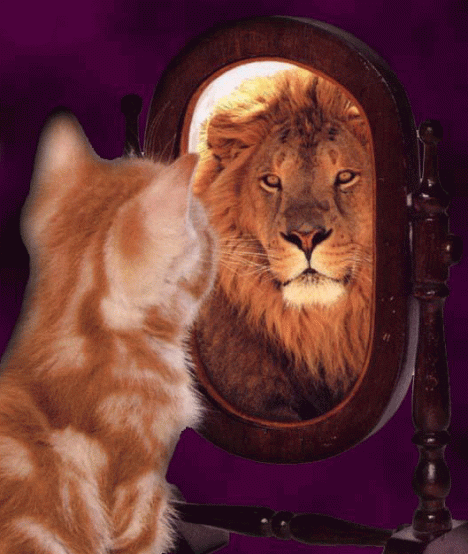Posted on November 19, 2010 by deepaloka
Brahman: The Ultimate Reality of Sanatana Dharma
Published on 07-16-2010 09:44 AM Number of Views: 473
By Sri Dharma Pravartaka Acharya
brahmano hi pratisthaham
amrtasyavyayasya ca
sasvatasya ca dharmasya
sukhasyaikantikasya ca
“Verily, I am the basis of the immortal Brahman, of eternal Dharma, and of the absolute bliss.“- Bhagavan Sri Krishna (Bhagavad Gita, 14:27)
Let us look at what Sanatana Dharma holds to be the Absolute. The ultimate goal and Absolute of Sanatana Dharma is termed “Brahman” in Sanskrit. The word comes from the Sanskrit verb root brh, meaning “to grow”. Etymologically, the term means “that which grows” (brhati) and “which causes to grow” (brhmayati).
Brahman is not Anthropomorphic “God”
Brahman, as understood by the scriptures of Hinduism, as well as by the ‘acharyas’ of the Vedanta school, is a very specific conception of the Absolute. This unique conception has not been replicated by any other religion on earth, and is exclusive to Sanatana Dharma. Thus to even call this conception of Brahman “God” is, in a sense, somewhat imprecise. This is the case because Brahman does not refer to the anthropomorphic concept of God of the Abrahamic religions. When we speak of Brahman, we are referring neither to the “old man in the sky” concept, nor to the idea of the Absolute as even capable of being vengeful, fearful or engaging in choosing a favorite people from among His creatures. For that matter, Brahman is not a “He” at all, but rather transcends all empirically discernible categories, limitations and dualities.

What is Brahman?In the ‘Taittariya Upanishad’ II.1, Brahman is described in the following manner: “satyam jnanam anantam brahma”, “Brahman is of the nature of truth, knowledge and infinity.” Infinite positive qualities and states have their existence secured solely by virtue of Brahman’s very reality. Brahman is a necessary reality, eternal (i.e., beyond the purview of temporality), fully independent, non-contingent, and the source and ground of all things. Brahman is both immanently present in the realm of materiality, interpenetrating the whole of reality as the sustaining essence that gives it structure, meaning and existential being, yet Brahman is simultaneously the transcendent origin of all things (thus, panentheistic).
The Nature of Brahman
As the primary causal substance of material reality (jagat-karana), Brahman does not arbitrarily will the coming into being of the non-Brahman metaphysical principles of matter and jivas (individuated consciousness), but rather they are manifest into being as a natural result of the overflowing of Brahman’s grandeur, beauty, bliss and love. Brahman cannot but create abundant good in a similar manner to how Brahman cannot but exist. Both existence and overflowing abundance are as much necessary properties of Brahman as love and nurturing are necessary qualities of any virtuous and loving mother.

Brahman is the Source One can say that Brahman Itself (Him/Herself) constitutes the essential building material of all reality, being the antecedent primeval ontological substance from whence all things proceed. There is no ex nihilo creation in Sanatana Dharma. Brahman does not create from nothing, but from the reality of Its own being. Thus Brahman is, in Aristotelian terms, both the Material Cause as well as the Efficient Cause of creation.The Final Goal & the Final Cause
As the source of Dharma, the metaphysical ordering principles inherent in the design of the cosmos, Brahman can be viewed as the Formal Cause. And as the final goal of all reality, Brahman is also the Final Cause. Being the ontological source of all reality, Brahman is the only substantial real that truly exists, all other metaphysical categories being either a) contingent transformations of Brahman, having their very being subsisting in attributive dependence upon Brahman, or else b) illusory in nature. These views about the nature of Brahman are in general keeping with the theological teachings of both the Advaita and the Vishishta-Advaita schools of Hinduism.
Brahman is the Ultimate Reality
All reality has its source in Brahman. All reality has its grounding sustenance in Brahman. It is in Brahman that all reality has its ultimate repose. Sanatana Dharma , specifically, is consciously and exclusively aiming toward this reality termed Brahman.
For further information on how you can achieve Brahma-vidya, or God-consciousness, please visit:
http://www.dharmacentral.com About the Author Sri Dharma Pravartaka Acharya (Dr. Frank Morales, Ph.D.) has been practicing and teaching Dharma for over 35 years. With a Ph.D. from the University of Wisconsin-Madison, he is the Director of the Center for Dharma Studies. Sri Acharyaji is currently recognized as one of the world’s foremost scholars on the Yoga tradition, Dharma and meditation, as well as being a truly authentic spiritual teacher. He is the Founder-Acharya of the International Sanatana Dharma Society. With a very large international following, Sri Acharyaji is especially renowned for his highly authentic approach to spirituality, his authoritative and scholarly method of teaching, and his clear emphasis on serious spiritual practice and direct experience of self-realization. He has lectured on Dharma at dozens of top universities, such as Harvard, Columbia, Rutgers, Cornell, and Northwestern. He has also served as a consultant for such Fortune 500 companies as Ford Motor Corporation and Lucent Technology. Sri Acharyaji’s teachings stress the achievement of enlightenment through the practice of meditation, Yoga, and directly experiencing the presence of the Divine. Another overarching aspect of Sri Acharyaji’s teachings focuses on the importance of love, compassion and service toward all living beings. Whether speaking to an audience of thousands, or having a heart-felt discussion with only one person, Sri Acharyaji vividly conveys a deeply moving sense of compassion, peace, humility, and spiritual insight that has endeared him to thousands of students and admirers throughout the world. For more information, visit: http://www.dharmacentral.com
Copyright Notice, (c) 2010-2012, Dharmacentral.com
You have the author’s permission to publish and/or forward this article for educational purposes only if it is left thoroughly unaltered, unchanged and unedited (with the inclusion of this notice), and if full credit is given to the author.
Filed under: Sri Dharma Pravartaka Acharya | Leave a comment »
Posted on November 18, 2010 by deepaloka
When a man has an idea of what he must be and how he must act,
and undermines this by not ceasing to act in the opposite way,
he must realize that his principles, his beliefs, his ideals,
will inevitably fall prey to hypocrisy and dishonesty.
It is the ideal that begets the opposite of itself.

Ketika manusia memiliki gagasan tentang menjadi apa ia seharusnya dan bagaimana harus bertindak,
dan melemahkan hal ini dengan tidak menghentikan untuk bertindak dalam arah yang berbeda,
dia harus menyadari bahwa prinsipnya, kepercayaannya, dan idealismenya,
pada akhirnya akan jatuh pada kemunafikan dan ketidak jujuran.
Adalah idealisme yang melahirkan lawan dirinya.
Krishnamurti
Filed under: Krishnamurti | Tagged: Be yoursel, cermin, diri sendiri, dishonesty, hipokrit, hypocrate, mirror, sendiri, yourself | Leave a comment »
Posted on November 18, 2010 by deepaloka
As an individual, a specific entity, you have physical, mental, and nervous limit, among others,
if you know your own limit and try to stay within these limits,
you are free.

Sebagai individu, sebuah entitas spesifik, anda memiliki keterbatasan fisik, mental dan syaraf,
jika anda tahu limit anda sendiri dan mencoba berada pada batasan batasan ini,
maka anda merdeka.
Svami Prajnanpad
Filed under: Svami Prajnanpad | Tagged: bersyukur, contented, grateful, merdeka, puas | Leave a comment »
Posted on November 4, 2010 by deepaloka
The absurd denial of the truth is natural in man.
Man does not want to be, but to appear to be.
He does not want to see what he is, but tries only to see himself as the person
other people take him for, when they talk about him

Penolakan yang tak masuk akal atas kebenaran adalah sangat normal pada manusia.
Manusia tidak ingin menjadi, tapi nampak sebagai menjadi.
Dia tidak ingin melihat apa adanya, tetapi mencoba melihat dirinya sebagai citra yang diciptakan oleh orang lain, ketika mereka berbicara tentangnya.
Svami Prajnanpad
Filed under: Svami Prajnanpad | Tagged: citra, denial, menyangkal, perception, persepsi | 2 Comments »
Posted on November 4, 2010 by deepaloka
The spiritual can never be attained,
until the material has been extinguished.

Spiritualisme tidak akan pernah dicapai,
hingga keterikatan keduniawian dimusnahkan.
Svami Vivekananda
Filed under: Swami Vivekananda | Tagged: Keterikatan, materialisme, spiritual | Leave a comment »
Posted on October 27, 2010 by deepaloka
As long as you pursue pleasure, you are attached to the sources of pleasure;
and as long as you are attached to the sources of pleasure,
you cannot escape pain and sorrow. The soul shines in the hearts of all living beings.
When you see the soul in others, you forget your own desires and fears,
and lose yourself in the service of others.
The soul shines equally in people on the farthest island, and in people close at hand

Selama anda mengejar kesenangan, anda akan terikat pada sumber kesenangan;
dan selama anda terikat pada sumber kesenangan, anda tidak dapat lari dari sakit dan penderitaan.
Jiwa bersinar dalam hati semua mahluk hidup. Ketika anda melihat jiwa dalam diri orang lain, anda lupa akan keinginan dan ketakutan, dan membenamkan diri anda dalam pelayanan pada yang lain.
Jiwa bersinar sama terangnya pada manusia dipulau terjauh, dan pada manusia terdekat.
Mundaka Upanishad
Filed under: Mundaka Upanishad | Tagged: escape, Kesenangan, lari, mundaka upanishad, Pleasure | Leave a comment »
Posted on October 27, 2010 by deepaloka
When a man is deprived of the foundation that provides him everything,
his poverty loses its best virtue, simplicity, to become no more than disgraceful and sordid.
His wealth is no longer splendid, but becomes merely extravagant.
His appetites no longer remain within natural limits; they no longer have the one goal
of meeting the needs of his life; they become an end in themselves,
setting fire to his existence, and dancing madly by the light of the flames.

Ketika manusia terampas dari dasar yang memberikannya segala sesuatu, kemiskinannya kehilangan kebajikan terbaiknya, untuk menjadi tidak lebih dari memalukan dan papa. Kekayaannya tidak lagi hebat, tetapi hanya menjadi keborosan. Nafsunya tidak lagi terletak dalam batas alami; nafsunya tidak lagi mempunyai tujuan tunggal memenuhi kebutuhan hidupnya; nafsu itu menjadi tujuan sehingga menyalakan api bagi eksistensinya, dan menari ke dalam jilatan api.
Rabindranath Tagore
Filed under: Rabindranath Tagore | Tagged: flame of light, fondasi, foundation, kobaran api, miskin, poverty | Leave a comment »
Posted on October 27, 2010 by deepaloka
Those who are focused on the objects of the senses, become attached to those objects.
From attachment comes desire; and from desire comes anger; from anger comes confusion of mind;
from confusion of mind comes loss of memory; from loss of memory comes loss of intelligence;
and from loss of intelligence comes destruction.

Mereka yang fokus pada obyek panca indra, menjadi terikat pada obyek tersebut.
Dari keterikatan datanglah keinginan; dan dari keinginan datanglah kemarahan; dari kemarahan datanglah kebingungan pikiran;
dari kebingungan pikiran muncul kehilangan ingatan; dari hilangnya ingatan terjadi kehilangan kecerdasan;
dan dari hilangnya kecerdasan datanglah perusakan.
The Bhagavad Gita
Filed under: The Bhagavad Gita | Tagged: Attachment, Focus, Fokus, hilang ingatan, Keterikatan, loss memory | Leave a comment »
Posted on April 17, 2010 by deepaloka
Free yourself from anger and desire, which are the causes of sin and conflict,
and thereby make yourself whole. This is the essence of yoga;
this is the means by which you come to know the soul, and thereby attain the highest spiritual state.
Learn to meditate. Close your eyes; calm your breathing; and focus your attention
on the center of consciousness. Thus you will master the senses, the emotions, and the intellect —-
and thereby free yourself from desire and anger.

Bebaskan diri anda dari kemarahan dan keinginan, yang menyebabkan dosa dan konflik,
dan dengan demikian membuat diri anda utuh. Ini adalah inti dari Yoga;
ini adalah cara anda mengetahui jiwa, dan karenanya mencapai keadaan spiritual tertinggi.
Belajarlah bermeditasi. Tutuplah mata anda; tenangkan nafas anda; dan fokuskan perhatian anda pada pusat kesadaran. Maka anda akan menguasai panca indra, emosi dan intelek—– dan dengan demikian membebaskan diri sendiri dari keinginan dan kemarahan.
The Bhagavad Gita
Filed under: The Bhagavad Gita | Tagged: anger, breathing, marah, nafas | Leave a comment »
Posted on April 17, 2010 by deepaloka
We are always comparing what we are with what we should be.
This measuring ourselves all the time against something or someone
is one of the primary causes of conflict. Now why is there any comparison at all?
If you do not compare yourself with another
you will be what you really are.

Kita selalu membandingkan kita sekarang dengan kita seharusnya.
Selalu membandingkan kita sendiri terhadap sesuatu atau seseorang adalah salah satu sebab utama penyebab konflik. Sekarang, mengapa ada proses membandingkan?
Jika anda tidak membandingkan anda sendiri dengan yang lain
anda akan menjadi anda sebenarnya.
Krishnamurti
Filed under: Krishnamurti | Tagged: comparison, diri sendiri, yourself | Leave a comment »










